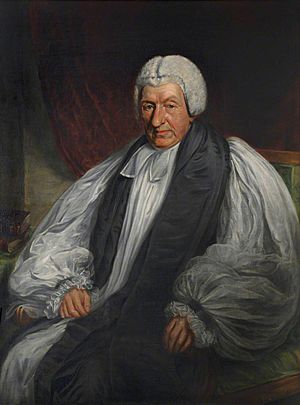Herbert Marsh facts for kids
Quick facts for kids The Right Reverend Herbert Marsh |
|
|---|---|
| Bishop of Peterborough | |
 |
|
| Diocese | Peterborough |
| In Office | 1819–1839 |
| Predecessor | John Parsons |
| Successor | George Davys |
| Other posts | Bishop of Llandaff (1816–1819) |
| Personal details | |
| Born | 10 December 1757 Faversham, Kent, England |
| Died | 1 May 1839 (aged 81) Peterborough, Northamptonshire, England |
| Buried | Peterborough Cathedral |
| Nationality | British |
| Denomination | Anglican |
| Spouse | Marianne Emilie Charlotte Lecarriere |
| Children | Herbert Charles Marsh George Henry Marsh |
| Education | Faversham Grammar School The King's School, Canterbury |
| Alma mater | St John's College, Cambridge |
Herbert Marsh (born December 10, 1757 – died May 1, 1839) was an important leader in the Church of England. He served as a bishop, which is a high-ranking church official.
Contents
Early Life and Education
Herbert Marsh was born in Faversham, Kent, England. His father, Richard Marsh, was a vicar, a type of priest, in the same town.
Young Herbert went to Faversham Grammar School. He also studied at The King's School, Canterbury. Later, he attended St John's College, Cambridge, a famous university.
At Cambridge, he was a very bright student. He graduated in 1779 and became a fellow of St John's College. This meant he was a member of the teaching staff.
New Ideas About the Bible
While still a fellow, Marsh traveled to Prussia. There, he studied with a scholar named J. D. Michaelis. He learned about "higher criticism." This was a new way of studying the Bible. It looked at the history of the Bible's texts.
When he returned to England, Marsh translated Michaelis's book about the New Testament. He also added his own ideas. He tried to solve the "synoptic problem." This is the puzzle of why the Gospels of Matthew, Mark, and Luke are so similar but also different.
Marsh suggested that there was an original, older story of Jesus. He thought this story was written in Aramaic. Then, it was translated into Greek. Copies of this Greek story were passed around. Over time, more information was added to these copies.
He believed that Mark's Gospel used two different copies. Matthew and Luke then used these copies too. Marsh's ideas were quite new for his time. They challenged older ways of thinking. This led to some debates with other church leaders.
Teaching and Church Leadership
In 1805, Herbert Marsh began to preach about his beliefs. He spoke against some ideas of Calvinism. He disagreed with the idea that faith alone was enough for salvation. He also disagreed with the idea that people could not lose God's grace. These sermons caused arguments with other church groups.
In 1807, he became the Lady Margaret's Professor of Divinity at Cambridge. This was a very important teaching job. He was the first person in this role to give his lectures in English. Before him, lectures were always given in Latin.
Becoming a Bishop
In 1816, Marsh was appointed the Bishop of Llandaff in Wales. As a bishop, he was very strict. He wanted all clergy to follow church rules closely. He was especially firm with those who had Methodist leanings.
Three years later, in 1819, he became the Bishop of Peterborough. He continued to be a strong leader. He was known for not allowing clergy with Calvinist beliefs to work in his diocese. This made some people, like Sydney Smith, upset with him.
Herbert Marsh passed away on May 1, 1839. He was buried at Peterborough Cathedral.
Writings
Herbert Marsh wrote several books and papers. These explained his ideas about the Bible.
- A Dissertation on the Origin and Composition of the Three First Canonical Gospels (1801)
- Letters to the Anonymous Author of Remarks on Michaelis and his Commentator (1802)
- An Illustration of the Hypothesis proposed in the Dissertation on the Origin and Composition of our Three First Canonical Gospels (1803)
 | Tommie Smith |
 | Simone Manuel |
 | Shani Davis |
 | Simone Biles |
 | Alice Coachman |

